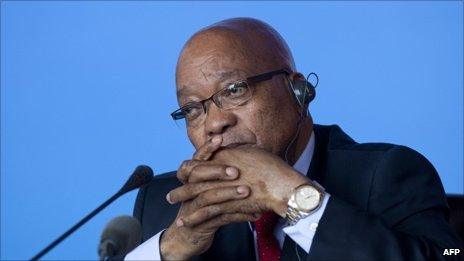South Africa's ultimate crime - the cover-up
- Published
- comments

The mounting scandals are putting pressure on President Jacob Zuma
It's not the crime - it's the cover-up. What was true for Richard Nixon three decades ago seems to be equally applicable in South Africa today.
As the establishment here sweats beneath a particularly cumbersome stack of scandals, what is most striking is not the alleged crimes themselves but the nonchalance with which the accused have shrugged off the very notion that they might be publicly accountable for their actions.
President Jacob Zuma - his in-tray piled high with damning reports - seems reluctant to force the issue.
So we have the board of Cricket South Africa - gloved and heavily padded - seemingly preoccupied with internal discipline rather than external transparency., external
Then there's the extraordinary swagger shown by Co-operative Governance Minister Sicelo Shiceka as he confronts a mountain of breathtaking evidence , externalcompiled by the country's public protector. He's accused, among other things, of flying to Switzerland at the taxpayer's expense to visit his convicted drug-dealer girlfriend in prison., external
And we have the Police Commissioner and the Minister for Public Works. And the list goes on., external
Due process must be followed of course, and the presumption of innocence honoured. But as the weeks slip by and President Zuma sticks stubbornly to the sidelines, the knives are starting to come out for him too. , external
And lest we think that corruption is confined to matters of business and theft, let me also throw in the scandal of the Dalai Lama's non-visit. If power corrupts, then surely the government's refusal to even acknowledge its own actions - let alone defend them - must count against it.
- Published9 July 2024

